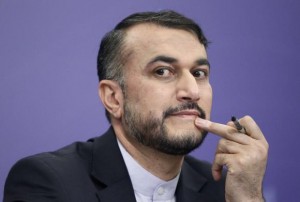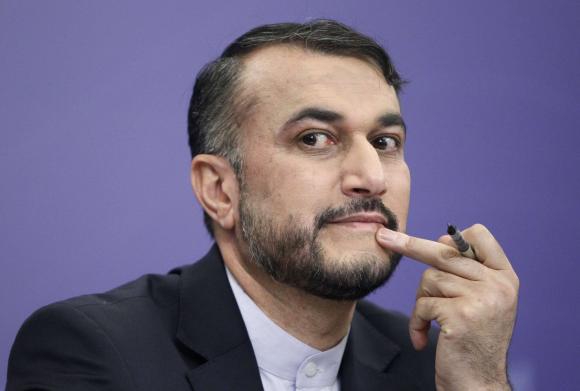 Iran's Deputy Minister for Arab and Foreign Affairs Hossein Amir Abdollahian attends a news conference in Moscow, September 10, 2013.[/caption]
Iran's Deputy Minister for Arab and Foreign Affairs Hossein Amir Abdollahian attends a news conference in Moscow, September 10, 2013.[/caption](Reuters) -�Iran, Syria's main regional ally, does not see President Bashar al-Assad staying in power indefinitely but neither does it want "extremist forces" to replace him, a senior Iranian diplomat said on Wednesday.
Amir Abdollahian, deputy foreign minister for Arab and African Affairs, added in an interview�Iran�hoped to have talks in a month or so with�Saudi Arabia, Tehran's regional rival, to address their differences about the Middle East.
Asked about Iranian activities in several Arab countries, he told Reuters that stability, peace and development "in�Yemen, Bahrain,�Syria�and any other country in the region will help the interests and security of the Islamic Republic of Iran".
Abdollahian, on a tour of some Gulf Arab states for talks about regional issues, said: "In order to answer your question in another way: We have a deep relation with�Syria. It's a strategic ally against�Israel."
He added: "We aren't seeking to have Bashar al-Assad remain president for life. But we do not subscribe to the idea of using extremist forces and terrorism to topple Assad and the Syrian government."
Syria's conflict has drawn in thousands of foreign fighters who fight either for the mostly Sunni Muslim rebels, which include radical Islamist militias aligned to al Qaeda, or for Assad, whose Alawite sect is an offshoot of Shi'ite Islam.
Saudi Arabia, Qatar and�Turkey�back some groups fighting Assad's forces. In turn, Assad gets political support from�Iraq�and Algeria, weapons from his old ally Russia, and military backing and advice from Iran, diplomats say.
POLITICAL SOLUTION
Abdollahian insisted Iran's aid to Syria was limited to humanitarian goods such as food and medicine and said military aid would not end the three-year-old war, which has cost an estimated 140,000 lives and uprooted millions.
"The situation vis-�-vis Syria has changed regionally," he said, adding it was necessary now for a "parallel track" to failed peace talks held in Switzerland earlier this year.
He did not elaborate on that or on what he has previously described as a four-part plan for Syria developed by Tehran and U.N. Special Representative for Syria Lakhdar Brahimi.
But he said Qatar, Saudi Arabia, Turkey "have all started to believe in a diplomatic process and are now more than ever working towards a political solution."
Diplomatic efforts, focused on the political rather than religious factors driving Syria's conflict, have made no headway.
Abdollahian was speaking after talks with United Arab Emirate's Minister of State for Foreign Affairs Anwar Gargash, which he said covered Syria, as well as Bahrain, Yemen and Egypt. He held talks in Kuwait on Tuesday.
"MISUNDERSTANDINGS" WITH SAUDI
Abdollahian expressed readiness to meet his counterparts in Saudi Arabia, but said Iran was waiting for Saudi Arabia to specify the exact date.
"Misunderstandings" between Saudi Arabia and Iran about Syria, Iraq and Bahrain could be solved through discussions, he said, adding: "We are hopeful to having discussions in the next month, or at the earliest possible moment."
Turning to efforts to resolve a long-running dispute over Iran's disputed nuclear program, Abdollahian expressed hope that negotiators for Iran and major powers would reach a final settlement by a deadline of July 20.
The talks were hard but "important steps" had been taken, he said.
The Islamic Republic has long denied accusations from Israel, Western powers and their allies that it has tried to develop the capability to produce atomic weapons under cover of a civilian nuclear energy program.
In November, Iran and the six powers struck an interim deal under which Tehran shelved higher-grade uranium enrichment and agreed to other constraints in exchange for modest relief from punitive economic sanctions.
The next set of nuclear negotiations are slated to take place in Vienna on April 7-9.
Abdollahian added that Noor Ahmad Nikbakht, an Iranian embassy official kidnapped in the Yemeni capital last year, was alive and in good health. "We have formed a joint committee with the Yemen security forces and their foreign ministry," he said without elaborating.
In January, another Iranian diplomat was fatally wounded when he resisted gunmen who tried to kidnap him.
Kidnappings of foreigners in Yemen are common, often carried out by al Qaeda-linked militants or by disgruntled tribesmen seeking to put pressure on the government to free jailed relatives or to improve public services.
By Reuters
The Iran Project is not responsible for the content of quoted articles.











